

 |
 |
|
 |
|
| About Us |
|
Read Past Issues | Resources | Composer Links |
Wuorinen, a native New Yorker, has been composing since he was five and has been a forceful presence on the American musical scene for more than four decades. In 1970, he became the youngest composer to win the Pulitzer Prize in music, the specific work being Time's Encomium, an electronic composition written on commission from Nonesuch Records. The Pulitzer and the MacArthur Fellowship are just two among many awards, fellowships and other honors to have come his way. Wuorinen has written more than 200 compositions to date. His newest works include Cyclops (2000) for Oliver Knussen and the London Sinfonietta, Symphony Seven, vocal setting of poems by John Ashbery, Les Murray, Derek Walcott and W.H. Auden, as well as three works for the Brentano Quartet: Fourth String Quartet, Alap and Josquiniana. In 1975 Stravinsky's widow gave Wuorinen the composer's last sketches for use in A Reliquary for Igor Stravinsky. Wuorinen was the first composer commissioned by the Cleveland Orchestra under Christoph von Dohnanyi (Movers and Shakers); and likewise the first to compose for Michael Tilson Thomas' New World Symphony (Bamboula Beach). Fractal geometry and the pioneering work of Benoit Mandelbrot have played a crucial role in several of his works including Bamboula Squared and the Natural Fantasy, a work for organ. His works have been recorded on nearly a dozen labels including the Piano Quintet, The Mission of Virgil and Percussion Quartet (Koch), A Reliquary for Igor Stravinsky (Deutsche Grammophon), Genesis for chorus and orchestra and Mass (Koch) a solo disc with pianist Alan Feinberg performing the Third Piano Sonata, Capriccio and Bagatelle (Grammy Award nomination) Wuorinen's works are published exclusively by C.F. Peters Corporation. He is the author of Simple Composition, used by composition students throughout the world (recently translated into Chinese). An eloquent writer and speaker, Wuorinen has lectured at universities throughout the United States and abroad, and has served on the faculties of Columbia, Princeton, and Yale Universities, the University of Iowa, University of California (San Diego), Manhattan School of Music, New England Conservatory, State University of New York at Buffalo, and is presently Professor of Composition at Rutgers University. Wuorinen has also been active as performer, an excellent pianist and a distinguished conductor of his own works as well as other twentieth century repertoire. His orchestral appearances have included the Cleveland Orchestra, Chicago Symphony, New York Philharmonic, San Francisco Symphony, Los Angeles Philharmonic, and the American Composers Orchestra. In 1962 he co-founded The Group for Contemporary Music, one of America's most prestigious ensembles dedicated to performance of new chamber music. In addition to cultivating a new generation of performers, commissioning and premiering hundreds of new works, the Group has been a model for many similar organizations which have appeared in the United States since its founding. Wuorinen is a member of both the American Academy of Arts and Letters and the American Academy of Arts and Sciences.
|
|
An Interview with Tobias Picker Handmaid Tale's Debuts in English Rautavaara Joins B&G Who's Afraid of Julia Wolfe Derek Bermel's Soul Garden The Pianist: The Extraordinary True Story of Wladyslaw Szpilman John Adams' Atomic Opera A Bridge Not Far Enough Turnage Signs With B&H Sophie's Wrong Choice Copland's Mexico On Being Arvo Rzewski Plays Rzewski Praising Lee Hyla David Lang's Passing Measures Three Tales at BAM Naxos at 15 On the Transmigration of Souls Dead Man Walking David Krakauer's The Year After Steve Reich/Alan Pierson
|

Ulisse Composer: Luigi Dallapiccola Conductor: Ernest Bour Radio France Dallapiccola's final masterpiece, the opera Ulisse, which premiered in Berlin in 1968, recounts the voyage both of Homer’s hero and of mankind's search for eternal truths. Recorded in 1975, a few months after the composer's death, this performance is the culmination of a lifetime of meditation and musical discipline by one of the great humanists of the 20th century arts. |

Early and Unknown Piano Works Composer: Morton Feldman Performer(s): Debora Petrina OgreOgress Productions Previously
unrecorded pieces from the early 40s reveal Feldman during the period
he
studied with Wallingford Riegger. No real surprises here but no
klunkers
either. His composition style borrows 12-tone techniques
and
atonality but deploys them within more traditional neo-classic
structures.
|

Guitar Concertos & Solos Composer: Poul Ruders Performer: David Starobin, guitar Bridge The
long and intimate collaboration between Poul Ruders, the brilliant
composer,
and David Starobin, the splendid guitarist, (who also happens to be
David
Starobin, the successful record executive--co-founder of Bridge
Records)--has
led to some of the most challenging and original compositions in the
modern
guitar repertory. Consider this a kind of "greatest hits" for the
modern classical guitar.
|

Symphonies 1 & 7 Composer: Aulis Sallinen Performer: Staatsphilharmonie Rheinland-Pfalz, Ari Rasilainen cpo Another great Finnish composer, ho hum, but Aulis Sallinen (b. 1935) is, with Rautavaara, the latest proof that small countries can produce big composers. There are hints of Sibelius, of course, but Sallinen is a unique voice that speaks directly. His work is tonal and completely devoid of the modern medievalism that characters much north of the Arctic Circle music. |
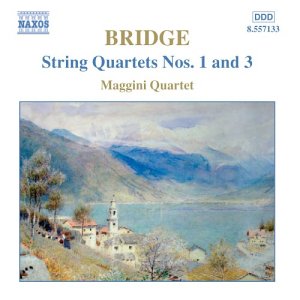
String Quartets 1 & 3 Composer: Frank Bridge Performers:. Maggini String Quartet Naxos Frank Bridge is a bit of a lost horse in the English stable of composers that includes such giants as Elgar, Vaughan Williams and, his student, Benjamin Britten. But he shouldn't be. No. 1, written in 1901, is a mature, fully realized work; No. 3, composed in 1927 is one of the pilars of 20th century chamber music. As always, the Maggini play magnificiently and the recording is first rate. |
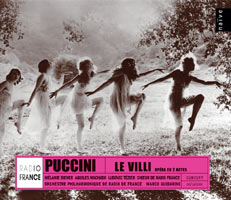
Le Villi Composer: Giacomo Puccini Conductor: Marco Guidarini Performer: Melanie Diener, Ludovic Tezier, et al. Radio France Chorus, French Radio Philharmonic Orchestra Naive Just
listening to young Puccini's first opera (as opposed to seeing it
staged
and sung), you notice immediately that the big sweeping melodies, the
ingenious
"hooks" are already there. Naive has also issued a Radio France
recording
of Puccini’s second opera, Edgar,
written five years after Le Villi. In this more ambitious
and
complicated work, Puccini develops his technique using a score that
merges
stirring arias and ensembles.
|
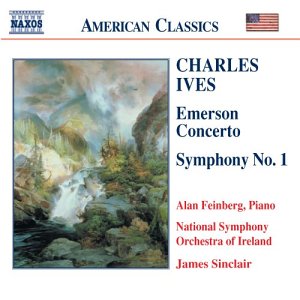
Emerson Concerto / Symphony 1 Composer: Charles Ives Performers: Alan Feinberg (piano), National Symphony Orchestra of Ireland, James Sinclair (conductor) Naxos Ives sketched the Emerson Concerto in 1907 but never fully finished it, although he used portions in other works. David G. Porter, a noted Ives scholar, was able to create a performing version which was premiered in 1998 by Alan Feinberg, the pianist on this premiere recording. The piece is extremely demanding, often abrasive, and demands exceptional virtuosity. Symphony No. 1 is fetching, but not as charateristic, of the great American maverick that followed. |
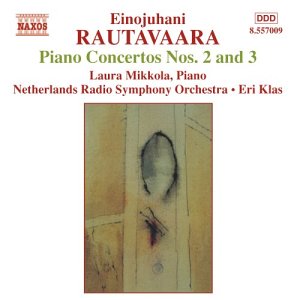
Piano Concertos 2 & 3 Composer: Einojuhani Rautavaara Performers: Laura Mikkola (piano), Netherlands Radio Symphony Orchestra, Eri Klas (conductor) Naxos The Finnish composer Rautavaara has enjoyed enormous success in recent years with his unique blend of northern lights impressionism and romanticism served up in an aura of modernity. His Cantus Articus is immensely popular, conjuring up associations of Messiean, although the latter is a much more important composer. The Third Piano Concerto from 1998 is forceful, drawings on the Russian school of pianism, although it not technically flashy until the finale. The Second, composed nine years earlier, is more traditional and Laura Mikkola, already on disc with a highly regarded account of the First Concerto, again provides an outstanding performance. |
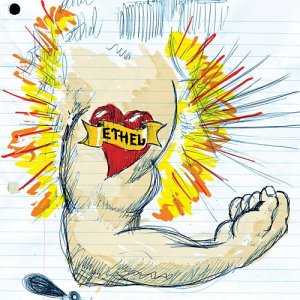 Ethel Composers: King, Kline, Reynolds, Ziporen Performers: Ethel Cantaloupe New
York's most daring string-quartet sensation, Ethel, makes its debut
here
with a menu of the kind of hard-edged downtown music that has won the
group
a big following in the NY new music scene. Todd Reynolds
and
Mary Rowell, violins; Ralph Farris, viola; and Dorothy Lawson,
cello—all
began their careers in New York as freelance musicians, playing
difficult
music that relies heavily on non-classical sources but requires a
virtuoso
classical ensemble to play. Its repertoire ranges from John King's
energetic
blues transcriptions to the gnarly quartets of Julia Wolfe
and on Todd Reynolds' quirky
|
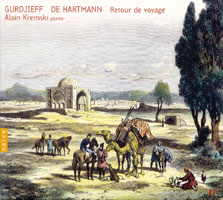
Return from a Journey Composers: Gurdjieff, De Hartmann, Performer: Kremski Naive Gurdjieff
was a Russian Aremenian spiritual master who, in addition to the main
body
of his teaching created sacred dances, or Movements, as well as
200
or so musical compositions--all of which were were done in
collaboration
with German composer Thomas de Hartmann at Gurdjieff's Institute
for the Harmonious Development of Man, near Paris, in the years
1925–27.
For many years, the pieces heard here were played only by De Hartmann
or
another of Gurdjieff's disciples but in recent years they have
attracted
the interest of a number of adventuresome pianists. Kremski plays
these exotic, vaguely oriental and oddly thematic pieces with great
respect
and warmth.
|
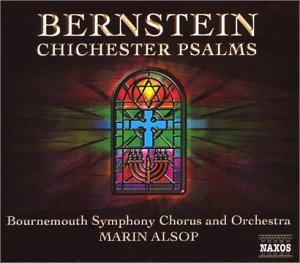 Chichester
Psalms
Chichester
Psalms
Composer: Leonard Bernstein Performers: Bournemouth Symphony Orchestra and Chorus, Marin Alsop (conductor) Naxos Commissioned in 1965 by the Dean of Chichester, Bernstein’s colorful Chichester Psalms is one of the composer’s most successful and accessible works on religious texts, contrasting spiritual austerity with impulsive rhythms in a contemplation of peace. The composer fashioned his Oscar nominated score to the 1954 movie On the Waterfront into a symphonic suite, skillfully capturing the oppression of the New York dockyards in the ’50s. The Three Dance Episodes were extracted from the popular On The Town, Bernstein's first successful foray into musical theatre. Bernstein protege Marin Alsop gets a robust performance from Bournemouth orchestra and chorus. |
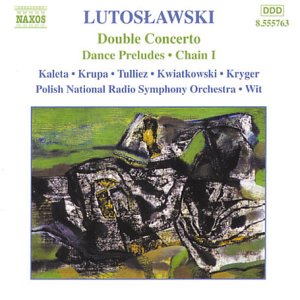
Double Concerto Composer: Witold Lutoslawski Performers: Polish National Radio Symphony, Antoni Wit Volume 8 in Naxos' indispensible survey of Lutoslawski's orchestra work brings us into lesser known territory but there are still treasures to be found. The Dance Preludes from 1955 is basically a five-movement clarinet concerto, with lots of interesting harmonies and rhythmic twists and turns. The Double Concerto for oboe and harp from 1990 rattles the ear a bit and has a demanding oboe part, beautifully played by Arkadiusz Krupa. The Children's Songs, gorgeously sung by the soprano, Urszula Kryger, are beguiling. |
 Doña Francisquita Composer: Amadeo Vives Performers: Maria Bayo, Alfredo Kraus, Orquesta Sinfonica de Tenerife, Antoni Ros Marba Naive A superb performance of Amadeo Vives' zarzuela masterpiece, sung with enormous vivacity and brio by the ravishing-voiced Maria Bayo and the sturdy Alfredo Kraus. With its nineteenth century Madrid setting, its roots in classical Spanish drama and its festive nocturnal amours, Doña Francisquita provides a retrospective on the romantic zarzuela tradition and its crowning glory. The work was immediately recognized not only as Vives’ masterpiece, but as the greatest full length zarzuela of its era. If you're not into zarzuela already, this is the perfect place to start your collection. |
 Symphony 9 Visionaria Composer: Kurt Atterberg Satu Vihavainen (mezzo-soprano); Gabriel Suovanen (baritone) NDR Choir, Prague Chamber Choir NDR Radio Philharmonic, Ari Rasilainen CPO The 9th and final symphony of Swedish composer Kurt Atterberg bears a superficial relationshp to Beethoven's 9th with its big, expresssive choral sound but Atterburg's world is a good deal less joyous. Atterberg's choice of texts reflects the lasting impact on his psyche made by World War II and the Korean War. The Poetic Edda, an Icelandic epic dating from around 1270, relates the visions of a wise prophetess (hence the Symphony's title "Sinfonia Visionaria") who foretells the creation of the world, the warring among gods, giants, and humans, the world's destruction, and finally its recreation. Atterberg uses mezzo-soprano and baritone soloists with chorus and large orchestra, as well as a quasi-oratorio form, to tell his epic tale. This is extraordinary symphony by a composer who is far too little-known in the musical world. |
 The Complete Mazurkas Composer: Karol Szymanowski Performer: Marc-Andre Hamelin Hyperion Marc-Andre Hamelin continues his extraordinary journey through the forgotten rivers and bayous of the modern piano repetoire with masterful performances of Szymanowski's Twenty Mazurkas, Op. 50, composed between 1926 and 1931. After assimilating the influence of Stravinsky, Szymanowski began looking for folk themes in Polish music to rival the Russian folk touches of the master. The Mazurka, a traditional Polish dance in three-quarter-time with an often erratic-seeming emphasis on the second beat, (and a favorite form for Chopin) offered great possibilities . These highly diverse pieces are more complex than Chopin, more modern and dissonant, yet also more muted and elusive. Still, Szymanowski remained too much a romantic to settle for anything less then flamboyant virtuosity--a quality that Hamelin possses by the truckload. |
 Accentus Composers: Transciptions: Bach, Barber, Berg, Chopin, Debussy, Mahler, Ravel, Wolf Peformers: : Choeur De Chambre Accentus, Equilbey Naive Worth having for the ravishing performances of Samuel Barber's "Adagio" and Mahler's "Adagietto from Symphony No. 5." |
 |
Search WWWSearch www.sequenza21.com |
